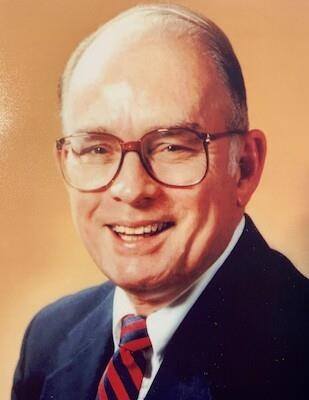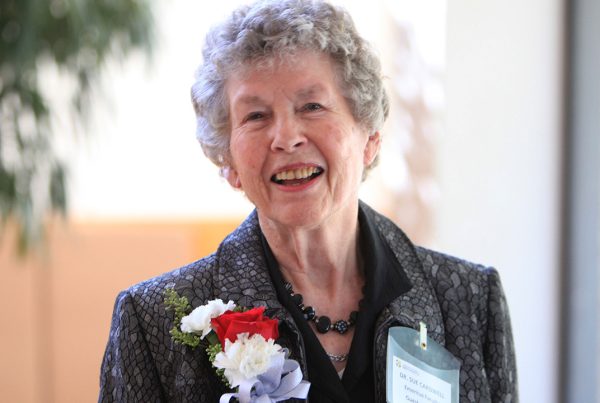 The life and career of Rev. Dr. Paul A. Crow, Jr., who died at the age of 89 on January 23, 2021, were defined by passion and persistence.
The life and career of Rev. Dr. Paul A. Crow, Jr., who died at the age of 89 on January 23, 2021, were defined by passion and persistence.
His passions included University of Alabama football, collecting books, and most especially his family: his spouse Mary, to whom he was married for 65 years, their three children, and their six grandchildren. Paul’s persistence was best seen in his nearly indefatigable fervor to introduce the ecumenical movement to an ever-widening circle of people.
One example is CTS trustee and former General Minister and President of the Christian Church (Disciples of Christ) in the United States and Canada, Rev. Dr. Richard Hamm. “Paul invited me to a meeting in Geneva of the Central Committee of the World Council of Churches when I was a regional minister. It was my first real exposure to world ecumenism, and I found it fascinating and invigorating. I credit Paul with shaping me into a real ecumenist.”
From a young age, Crow showed interest in the life of the church beyond the walls of his home Disciples congregation in Lanett, AL. He served as president of the Disciples International Christian Youth Fellowship and participated in the United Christian Youth Movement, coordinated by the Youth Department of the National Council of Churches. He was active in campus ministry as a student at the University of Alabama, even serving briefly as interim campus minister.
At the College of the Bible, now Lexington Theological Seminary (LTS), Crow studied with noted church history professor Howard Short and Charles Clayton Morrison, editor of The Christian Century and well-known ecumenist. He earned master’s and doctoral degrees at the Hartford Seminary Foundation, a school known for its emphasis on missions, church history, and ecumenism, writing dissertations focused on the formation of the ecumenical Church of South India and the Faith and Order movement.
Both dissertations foreshadowed future employment. After teaching seven years at LTS, Crow became the first general secretary of the Consultation on Church Union (COCU) partly due to his familiarity with the Church of South India and the desire to use it as a model for church union in the United States.
Rev. Dr. Keith Watkins, Professor Emeritus of Practical Parish Ministry at CTS, shared an experience toward the end Crow’s tenure, “COCU was losing momentum. Paul realized that a major reason was that the recently approved document, A Plan of Union, placed undo emphasis on organizational issues rather than on the sacramental core of the Consultation’s vision. On the final day of the assembly (in Denver, 1971) he told the delegates that their renewal would come not from legislative acts but from ‘new experience in community, new relationships among persons, congregations, and institutions.’”
Upon leaving COCU to become President of the Council on Christian Unity (CCU) for the Christian Church (Disciples of Christ), Crow reflected, “I was privileged to participate in the most dramatic process toward Christian unity in American history.”
Crow served as President of CCU from 1974-1999. His tenure included significant ecumenical advances for the denomination, including the full communion partnership with the United Church of Christ, the creation of the Peter Ainslie III Lectures on Christian Unity and the Joe A. and Nancy Vaughn Stalcup Lectures on Christian Unity, and the initiation and development of the International Commission for Dialogue between the Disciples and the Roman Catholic Church.
General Minister and President of the Christian Church (Disciples of Christ), Rev. Terri Hord Owens, said, “Paul helped us live into our understanding of Christian unity as part of the one body of Christ, a commitment which continues to define us as Disciples of Christ. His ministry encouraged us to be the church we say we are.”
During Crow’s presidency of CCU, he was appointed an affiliate faculty member at CTS, teaching courses in church history, theology, and ecumenism. He continued to teach, intermittently, until the early 2000s. “His courses drew on his rich experience in cross-cultural and inter-religious encounter, and the mature understanding of theology and Christian mission that came out of it,” remarked Rev. Dr. Scott Seay, Associate Professor of History of Christianity at CTS.
Crow’s impact at CTS continues to today in at least two significant ways. First, he introduced the school to now-President David M. Mellott. “Personally, I’m grateful for Dr. Crow’s extraordinary mentoring nearly 30 years ago when I was learning about the history, theology, and polity of the Christian Church. Thankfully, he included an introduction to CTS and my first tour of the building!”
Secondly, a substantial portion of Crow’s library was delivered to the CTS library last week. According to Seay, who also serves CTS as Director of Library and Information Services, “his library and personal papers will greatly enhance our already significant collection in the modern ecumenical movement and the place of the Christian Church (Disciples of Christ) in it.”
Rev. Dr. Robert Welsh, who served as Associate Ecumenical Officer for twelve years and later succeeded Crow as President of CCU, encapsulated Crow’s impact, “Paul gave significant leadership for over 40 years in promoting the unity of all Christians and the oneness of Christ’s Church in its local, regional, national and international expressions. Indeed, Paul helped to define and shape the ecumenical movement in many ways – especially in nurturing seminary students and younger pastors in understanding their call to a ministry that includes the vision of unity and reconciliation as the ‘matrix for mission’ in our world today.”
The CTS community gives thanks for the life and ministry of people like Paul Crow who combined active faith, scholarship, life in the church, and prominent leadership in the world-wide ecumenical movement.



